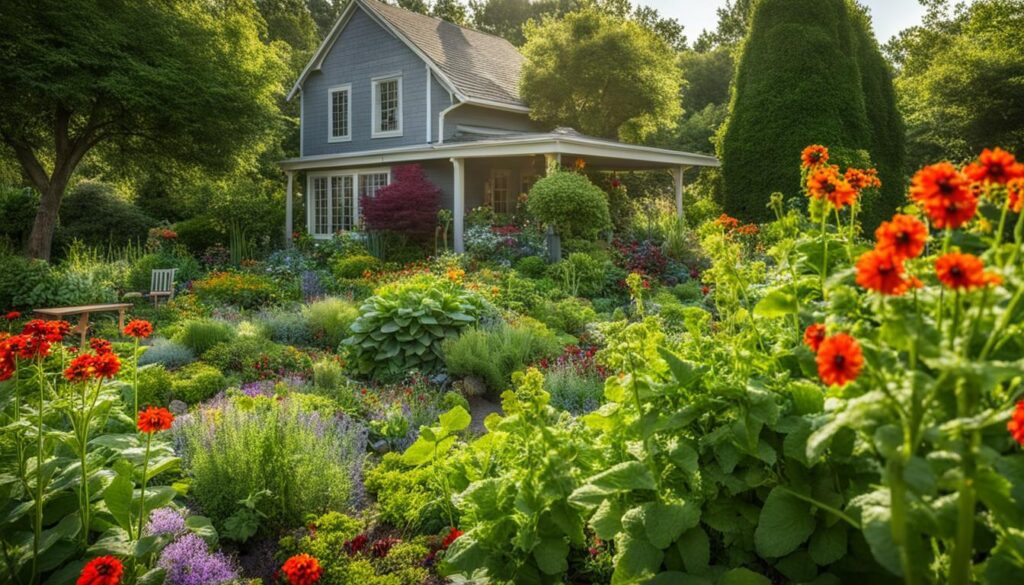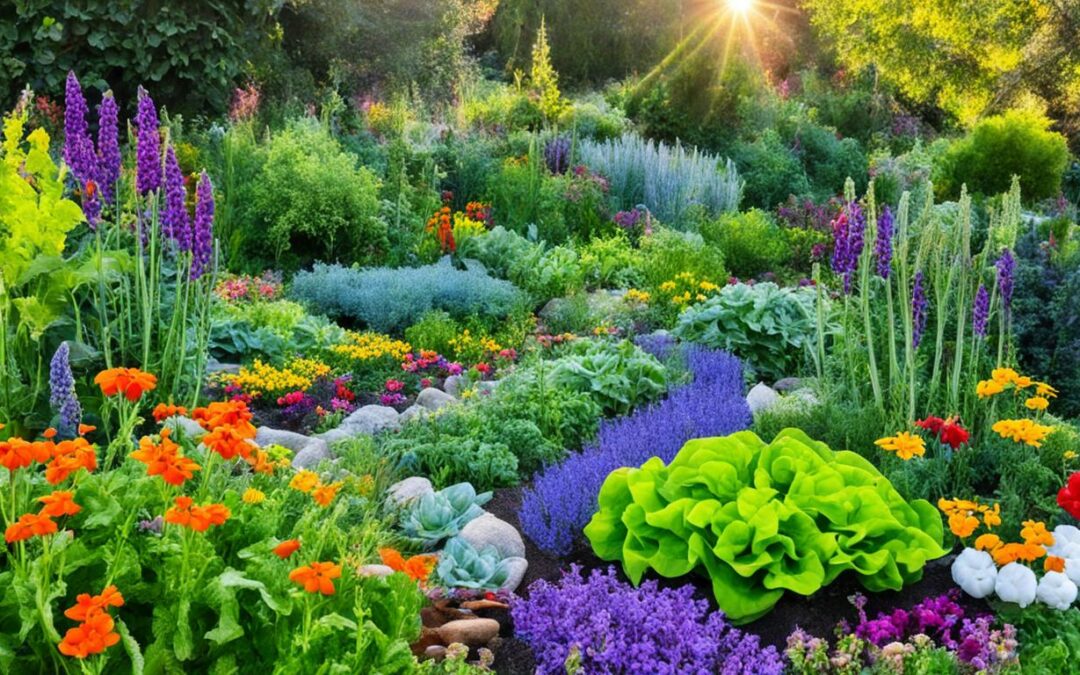Are you a fan of home and garden projects? Do you enjoy gardening, landscaping, and improving your outdoor living space? If so, you know how frustrating it can be to deal with pests in your garden. Luckily, there are natural methods for pest control that can help you maintain a healthy and thriving garden without relying on harmful pesticides.
Prevention is the key when it comes to minimizing insect damage in your garden. By pulling out weak plants, building healthy soil, minimizing insect habitat, interplanting and rotating crops, keeping foliage dry, disinfecting tools, and avoiding uncertified transplants, you can create an environment that is less attractive to pests.
Another effective method is attracting beneficial insects to your garden. These insects, such as brachonids, chalcids, ichneumon wasps, ladybugs, lacewings, hover-flies, praying mantis, and nematodes, prey on harmful garden pests and help keep their populations in check.
Non-toxic homemade remedies can also be used for pest control. Mixtures of vegetable oil and soap work well on soft-bodied insects, while milky spore is effective against grubs. Hot pepper sauce or cayenne pepper can deter mites and other insects, while diatomaceous earth is lethal to crawling insects. For fungal diseases, baking soda can be a natural solution, while lime sulfur and dormant oil can control insects on fruit trees.
By incorporating these natural methods into your gardening routine, you can enjoy a pest-free garden that is not only beautiful but also safe for you, your family, and the environment. Say goodbye to harmful pesticides and hello to a thriving, eco-friendly garden!
The Benefits of Using Natural Pest Control Methods
Using natural pest control methods in the garden provides several benefits. It reduces the use of harmful pesticides that can have negative effects on human health, the environment, and beneficial insects. Natural methods also increase biodiversity, reduce pollution in groundwater, provide protection for pollinators, and produce healthier fruits and vegetables.
By utilizing plant combinations, such as marigolds with tomatoes or sage with carrots, pests can be deterred from infesting the garden. Other plants, such as basil, catmint, chives, garlic, mint, onions, coriander, and tansy, also have pest-repellent properties. These natural pest control methods are not only effective but also sustainable, promoting a healthier and more eco-friendly garden.

Implementing natural pest control methods helps create a balanced ecosystem in your garden. By avoiding the use of synthetic chemicals, you protect the health of your family, pets, and the environment. Additionally, these methods support beneficial insects like bees and butterflies, which play a crucial role in pollination.
When you utilize plant combinations for pest control, you not only deter unwanted pests but also enhance the aesthetic appeal of your garden. The vibrant colors, textures, and scents of companion plants create a visually appealing and fragrant environment.
Furthermore, incorporating natural pest control methods aligns with sustainable gardening practices. By reducing reliance on chemical pesticides, you contribute to the overall well-being of the ecosystem. Your garden becomes a harmonious space that supports diverse plant and animal life.
How to Use Plants as Natural Pest Control
Using plants as natural pest control in your garden is not only effective but also sustainable. By incorporating certain plant combinations and varieties into your garden, you can deter pests without the use of harmful pesticides. These natural pest control methods can help maintain a healthy and thriving garden. Here are some effective plant options to consider:
Marigolds and Tomatoes
Marigolds are known for their ability to repel various pests, including nematodes, aphids, and whiteflies. Planting marigolds alongside your tomatoes can help protect them from these common garden pests. The strong scent of marigolds acts as a natural deterrent, keeping harmful insects away from your tomato plants.
Sage and Carrots
Planting sage near your carrot plants can help repel pests like carrot flies. Sage has natural insect-repellent properties, making it an effective companion plant for carrots. Additionally, the aromatic scent of sage adds a pleasant fragrance to your garden.
Basil for Asparagus Beetle, Carrot Fly, and Whitefly
The scent of basil is highly disliked by asparagus beetles, carrot flies, and whiteflies. By planting basil near susceptible plants, you can help deter these pests from infesting your garden. Basil also makes a flavorful addition to your meals and enhances the overall aesthetics of your garden.
Chives for Aphid Control
Chives are excellent natural pest control plants for aphids. They emit a strong onion-like scent that repels aphids, preventing them from attacking neighboring plants. Chives are easy to grow and can be used as a versatile herb in various culinary dishes.
Garlic for Aphids, Cabbage Moths, and Rabbits
Garlic is known for its strong aroma, which acts as a natural deterrent for aphids, cabbage moths, and rabbits. Planting garlic bulbs around your garden can help protect a wide range of plants from these common pests. Additionally, garlic can be harvested and used to add flavor to your favorite recipes.
Mint for Aphid, Cabbage Moth, Whitefly, and Ant Control
Mint plants are effective at repelling aphids, cabbage moths, whiteflies, and ants. Planting mint in your garden can help protect your plants from these pests, while also providing you with fresh leaves for teas and culinary uses. However, it’s important to keep mint contained, as it can become invasive if left unchecked.
Onions for Aphid, Carrot Fly, and Rabbit Control
Onions have a strong scent that repels aphids, carrot flies, and rabbits, making them valuable for natural pest control. Consider planting onions near susceptible crops or interplanting them with other vegetables to deter pests. Onions can be harvested and used in various dishes, adding flavor and nutrition to your meals.
Coriander for Aphid Control
Coriander, also known as cilantro, has properties that repel aphids. Planting coriander near susceptible plants can help keep aphids at bay. Plus, you’ll have a fresh supply of this popular herb for culinary use.
Tansy for Ant Control
Tansy is a flowering plant that has natural insect-repellent properties, particularly against ants. Planting tansy around your garden can help deter ants from invading your plants and disrupting their growth. Tansy also adds a touch of beauty with its attractive yellow flowers.
By incorporating these plants into your garden, you can naturally control pests without relying on harmful pesticides. Enjoy a thriving and pest-free garden while promoting a more sustainable and eco-friendly approach to gardening.
The Sustainable Benefits of Garden Plants
Garden plants offer more than just natural pest control; they provide a range of sustainable benefits that make them invaluable additions to any home garden. By incorporating these plants into your outdoor living space, you can create a harmonious and eco-friendly environment that supports both the health of your garden and the planet.
Cleaner Air and Healthier Atmosphere
Did you know that garden plants play a vital role in purifying the air we breathe? Through a process called photosynthesis, plants absorb carbon dioxide and release oxygen, helping to reduce the levels of harmful gases in the atmosphere. Additionally, garden plants have the remarkable ability to absorb chemicals and bacteria from the air, creating a cleaner and healthier environment for you and your loved ones.

Safeguarding the Soil and Promoting Growth
The roots of garden plants play a crucial role in protecting the soil from erosion. As these roots spread and intertwine, they bind the soil particles together, preventing them from being washed away by wind or water. This soil protection helps to maintain its fertility and structure, enabling optimal plant growth.
Furthermore, garden plants contribute to the natural cycle of nutrient replenishment in the soil. Even after annual plants die, their decomposition adds valuable organic matter and nutrients back into the soil. This process promotes healthy plant growth without the need for synthetic fertilizers or harmful chemicals, making your garden a truly sustainable and self-sustaining ecosystem.
Supporting Pollinators and Biodiversity
One of the most critical roles that garden plants play is their support of pollinators. Bees, in particular, are crucial for the reproduction of many plants, including fruit trees, vegetables, and flowers. By choosing the right plants and creating a pollinator-friendly landscape, you can attract and support these vital pollinators, ensuring the continued health and survival of your garden.
Moreover, incorporating a diverse range of garden plants promotes biodiversity and helps to create a thriving ecosystem. Different plants attract a variety of beneficial insects, birds, and other wildlife, contributing to a well-balanced and resilient natural environment. This biodiversity not only enhances the beauty of your garden but also creates a sustainable habitat for a wide range of living creatures.
The Sustainable Benefits of Garden Plants
| Benefit | Description |
|---|---|
| Cleaner Air and Healthier Atmosphere | Plants absorb carbon dioxide and release oxygen, while also filtering chemicals and bacteria from the air. |
| Safeguarding the Soil and Promoting Growth | The roots of garden plants protect the soil from erosion and provide organic matter for nutrient replenishment. |
| Supporting Pollinators and Biodiversity | Garden plants attract pollinators like bees, contributing to the reproduction of plants, and promote a diverse range of wildlife. |
By harnessing these sustainable benefits of garden plants, you can create a beautiful and eco-friendly space that not only enhances your home and garden but also contributes positively to the environment. So go ahead and embrace the power of nature in your own backyard!
More Resources for Natural Pest Control in the Garden
If you’re looking to effectively and sustainably control pests in your home garden, there are a variety of resources available to help you. Websites like Blooming Haus offer valuable advice on using plants for pest control and provide inspiration for plant combinations that can deter unwanted insects. By incorporating the right plants into your garden, you can naturally repel and control pests without the need for harsh chemicals.
If you prefer a DIY approach, articles from Treehugger provide detailed instructions for making homemade natural insecticides using common ingredients like vegetable oil, soap, garlic, mint, tomato leaves, and chile peppers. These simple remedies are not only effective in controlling a wide range of pests but also eliminate the use of harmful chemicals that can be detrimental to the environment and beneficial insects.
For a more comprehensive guide, Rodale’s Organic Life offers insights into the benefits of using plants for natural pest control. Their guide provides a list of specific plants that deter common pests, allowing you to create a garden that naturally discourages unwanted visitors. By exploring these resources, you can learn valuable techniques and tips to effectively manage pests in your garden while maintaining a safe and eco-friendly environment.

